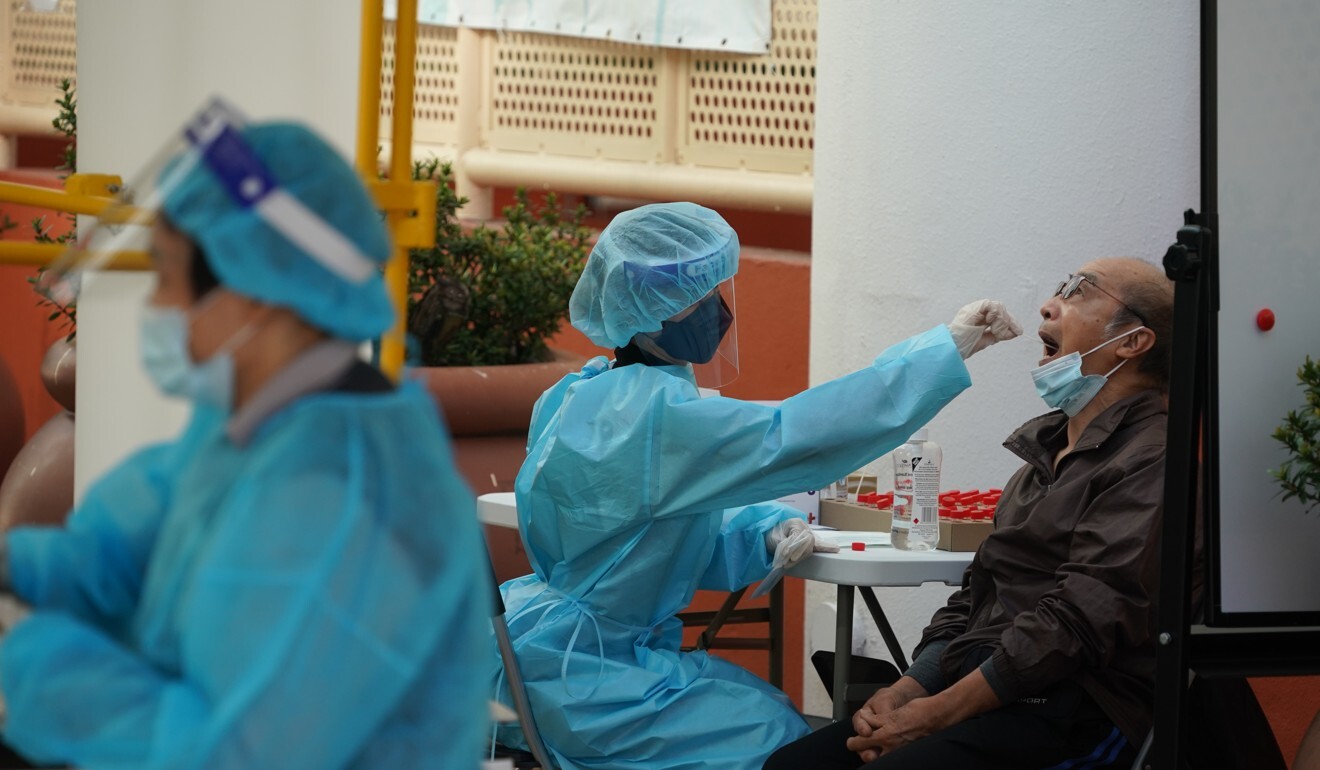
Hong Kong fourth wave: ‘sustained’ evidence of Covid-19 uncovered in housing block sewage, more than 700 households to undergo coronavirus testing
- Residents of 731 flats at Fung Chak House in Choi Wan (II) Estate – as well as recent visitors – must be screened after disease was detected in sewage samples
- Health officials say public hospitals’ infection-control rules will be overhauled amid expanding outbreak at United Christian Hospital
Details of the new coronavirus-detection drive were unveiled on a day that the city confirmed 61 new cases of Covid-19, and health officials said public hospitals’ infection-control rules would be overhauled amid an expanding outbreak at United Christian Hospital.
The wide-ranging reforms included a second Covid-19 test for inpatients with respiratory symptoms who had tested negative in their first one. United Christian, which has seen the largest coronavirus spread in a local hospital with 19 cases to date, will stop taking in new Covid-19 patients as a temporary measure.
On the first Monday after the Christmas break, residents of Fung Chak House at Wong Tai Sin’s Choi Wan (II) Estate awoke to the news that sewage samples taken from their pipes on December 23, 24, 26 and 27 had tested positive for the coronavirus.
They soon learned that officials had ordered mandatory screening for all residents in the block of 731 flats, as well as for those who had visited the building for more than two hours since December 15.
Professor Zhang Tong, whose team in the University of Hong Kong’s (HKU) department of civil engineering developed the monitoring programme, and government officials explained that the screening order was backed by the four consecutive positive results across a five-day period, and based on a “precautionary principle” even though none of the building’s residents had previously been confirmed as infected.
“We hope the results [of sewage testing] can provide early signals before we identify confirmed cases,” Zhang told a briefing in the morning.
Hong Kong government prioritised rich over poor during pandemic, experts say
Health authorities had previously collected samples from the surfaces of drain and vent pipes at residential buildings where infection clusters had emerged to check for environmental contamination and leakage.
But the monitoring system, similar to ones used across the world in the past to detect polio and antimicrobial resistance, was only launched in October and has collected about 300 domestic sewage samples from different areas in the city.
The coronavirus can remain in the stool of carriers after it is no longer detected in respiratory or saliva samples.

The detection system covers more than 2 million people in Kowloon and the New Territories.
Although no cases from Fung Chak House have been confirmed, Ming Lai House, a building about 300 metres (320 yards) away, has recorded 13 infections.
Professor Gabriel Leung, dean of HKU’s faculty of medicine who gave Zhang’s team public health advice, said his suspicion was that virus spread had taken place in the area. By Monday afternoon, a mobile testing station had been set up near the block.
Apart from pre-emptively identifying a possible cluster, Leung said, the system could also be used to detect whether any virus carriers remained in an area after human testing had been completed.
The epidemiologist added that the system had previously been used to test sewage from coronavirus-hit estates such as Kwai Shing West, Richland Gardens and Yat Ming Chuen, but no consecutive positive results were found.
A complication, however, could arise if pipes from different blocks were connected, making it hard to pinpoint the source of the virus. But the Fung Chak House samples were exclusively from that building, Leung said.
In an afternoon briefing, meanwhile, public hospital chiefs unveiled new measures to combat the spread of Covid-19 after another six people at United Christian were infected.
“We take [the outbreak] very seriously … That’s why we have reviewed our overall infection control situation and hospital services,” said Dr Tony Ko Pat-sing, the authority’s chief executive.
Coronavirus: Malaysia extends restrictions; Indonesia, Japan curb travel
Ko said United Christian would stop taking in new Covid-19 patients from the authority’s central allocation system as a temporary measure, adding that other hospitals – including the city’s first makeshift one near the airport, slated to open in late January – could help meet demand.
Under the strengthened measures, public hospitals will conduct a second Covid-19 test for symptomatic inpatients within two days of admission to catch any false negative results in the first screening. The second test would collect samples from the lower respiratory tract, which contains a higher concentration of the virus, according to Dr Raymond Lai Wai-man, the authority’s chief infection control officer.

The authorities had already announced testing for all United Christian staff, and were mulling regular screening for all public hospital employees.
Patients’ family members visiting on compassionate grounds will need to test negative before entering hospitals, though some under exceptional circumstances who cannot wait for testing will be allowed to take a test after visitation.
Lai added that officials had also reviewed protective equipment protocols, and that medical workers would wear face shields, goggles and gloves when conducting high-risk procedures, such as feeding patients or offering mouth care.
Checkpoint uncovers 76 Hongkongers who violated Covid-19 testing order
The authority would also increase procurement of medical equipment, such as blood pressure monitors, to avoid sharing among patients, and reduce movement of beds and patients within facilities to prevent cross-infection.
Patients confirmed with Covid-19 on Monday ranged in age from one year old to 100, all but one of them acquiring the virus locally.
In Sha Tin, a preliminary-positive case was detected in Lek Yuen Estate’s Wing Sui House, where six infections in three flats were found earlier. Some previous patients lived in opposite flats on the same floor.

Dr Chuang Shuk-kwan, head of the Centre for Health Protection’s communicable disease branch, said a mandatory order could be issued for residents there on Tuesday if the latest infection was confirmed.
A Vietnamese detainee at Ma Tau Kok Immigration Detention Centre was found to be positive for the virus in a second test on the 12th day of admission, prompting the authorities to quarantine six people who shared the same room and screen everyone in the facility.
Separately, Covid-19 killed four more people, including a 74-year-old woman linked to the United Christian Hospital cluster. That took the death toll to 141, while the total coronavirus tally stood at 8,672 cases. More than 40 preliminary-positive cases were also recorded and awaited confirmation.
Professor David Hui Shu-cheong, a respiratory disease expert at Chinese University, welcomed the tightened hospital testing regime, but suggested more flexibility would be better, as some Covid-19 patients would only show symptoms and test positive for the virus after the first two days in hospitals.
He said the average stay for inpatients at a general ward was five days, adding a second test could be taken on the fourth day.
The sewage monitoring system, he said, had already been used to detect Covid-19 in countries such as the United States, the Netherlands and Australia, and he believed it could be a “supplementary” device in Hong Kong’s testing mechanisms.
HKU microbiologist Dr Ho Pak-leung warned of a “V-shaped” surge in cases over the next one to two weeks, as people seemed to “let their guard down” over Christmas.

